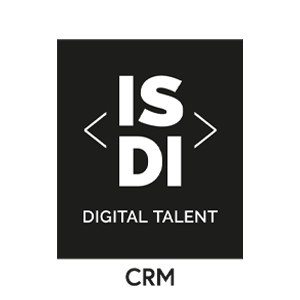Salesforce: cloud-based customer relationship management

Salesforce is one of the most innovative CRMs in the market. With these kind of online platforms, customer relationship management was never that easy to handle. Learn more about the highlights of Salesforce.
The term CRM comes from the acronym in English for customer relationship management. Nowadays, the implementation of a CRM is an essential task within any organization. Since the popularization of the internet, new online platforms have arrived to manage every kind of duty perform inside a company, searching for swiftness and efficiency.
It was in 1999 when Salesforce was launched into the market, it was then the top performing customer relationship management online platform, and today it is still a leader in its sector. In a brief period of time Salesforce grew its customer base exponentially and today has the privilege of being chosen, for 13 years in a row, a leader of Gartner’s Magic Quadrant.

One of the key reasons that explain Salesforce’s success it’s because it platform works on the Cloud, allowing the user to have access to this platform just by owning an online account. This system does not require any previous downloads or installation of software on your computer.
We just need an Internet connection and to be registered online
What is it for and what does Salesforce allow us to do?
Generally speaking, Salesforce works as a very detailed agenda of your company contacts with many functionalities and customization possibilities. It allows you to set up appointments with your customers and many other options to keep track of your commercial activities.
Another factor in which Salesforce stands out, compared to other CRMs, is its individual treatment of every client or customer. Let’s not forget that one of Salesforce’s claims is its “customer-centric vision”. It is essential, in any business, to deal with customers one by one without losing sight of their specific needs. But on the other hand, managing thousands of contacts can get extremely complex. This CRM helps us group accounts, generate collaboration within the team and with other departments, and also centralize the registration of communication with our customers, so we can have reports on status and evolution of those relationships.
Regarding its contact list functions, it offers us a classification of contacts associated with the client’s business accounts, allowing at the same time multiple attributes to store relevant information and the possibility to define our own. Likewise, we can create hierarchies to represent complex business groups, and to establish relationships between contacts.
Account listings can also be customized and they can have different looks to divide big accounts from potential clients, etcetera. It is possible to import data from any email tool and then link each contact with their profile on social media and synchronize back with our email the contributions made in Salesforce. It is a very efficient way to combine, in a single tool, all the data we have about our customers and then see directly the preferences and requirements they are showing.
From the general view to the particular: Salesforce in detail
Until now we have only reviewed the surface of what Salesforce really is. This CRM pulls together companies and customers with an integrated platform denominated Salesforce Customer 360. Here we can find various types of products that fit inside all the business area’s needs.
For example, in order to keep a good commercial relationship with our customers, we can also perform a registry of activities regarding vendors and their contacts. Besides, we will have the advantage of having it all stored in one server and in a totally safe environment, which can be accessed from any device, from any place, at any time.

Therefore, Salesforce includes a great range of products that are categorized under these groups: Sales, Service, Marketing, Commerce, Engagement, Platform, Integration, Analytics, Industries, Communities, Enablement and Productivity.
The company updates its products very regularly and releases 3 free CRM updates per year. More than 150,000 companies worldwide trust Salesforce, and there are companies dedicated solely and exclusively to customizing Salesforce CRM in detail for each customer’s needs.
AppExchange: app integration inside Salesforce
As we have mentioned earlier, we can use Salesforce to customize the different functionalities and products from the platform. On top of that, it has AppExchange, where we are offered the opportunity to implement both Salesforce’s own applications and independent third-party apps, enabling the possibility to build larger solutions or integrate CRM comfortably in a complex ecosystem. Some of these apps are:
- Campaign Monitor: an Email Marketing tool that integrates with your customer and candidate databases. Mainly used to follow campaigns directly from Salesforce.
- Campaign Tracker: this is an application destined to manage Google AdWords and Analytics. With it we will learn about the number of leads coming from advertising campaigns and discover more about the customer journey made by the users, even if they have asked about more information or if they bought in our website.
- Lead Scoring: this tool gives a score to each candidate based on their chances to buy or purchase, depending on their behaviour regarding our website (if they have called more than once asking about the same product, for example, or if they have opened the same email 30 times).
- Pardot Marketing Automation: this app belongs to Salesforce and offers different automation and Sales tools that helps us sell and maximize the efficiency of our teams, increasing the bottom line profitability. This tool tracks visits, who has opened your emails, who has downloaded the attached files, and other functionalities.
Many of these applications present on AppExchange are free and others have a monthly payment per company.
Salesforce is so big and complex that it can feel overwhelming. A good approach can be to sign up on TrailHead (Salesforce’s learning tool) where anyone can learn the basics of this platform, step by step.
If you decide to start training in Salesforce, the recommended (and necessary) starting point is a “Administrative Essentials for New Admins in Lightning Experience” course. In any case, at ISDI CRM, an official Salesforce partner, we will help you certify yourself as a professional expert.
Did you find this article interesting? Share it!
Maybe your friends will also enjoy this.




